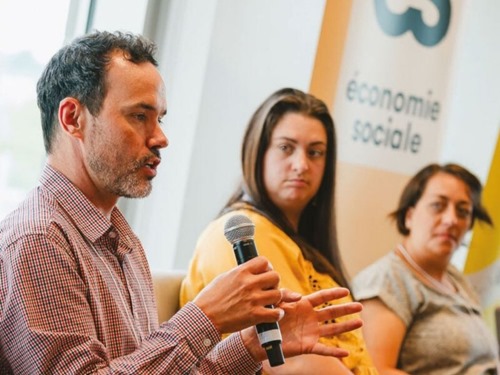Entreprendre Sherbrooke helps shape city's historic Social Economy Policy
/Entreprendre_Sherbrooke_advocates_for_establishing_Social_Economic_Policy.jpg)
The City of Sherbrooke has officially adopted its first-ever Social Economy Policy, a groundbreaking achievement co-created through collaborative efforts led by IASP member Entreprendre Sherbrooke alongside the Pôle d'entrepreneuriat collectif de l'Estrie and the city's Economic Development Department.
Entreprendre Sherbrooke's involvement was instrumental in shaping the policy framework to serve as a strategic lever for strengthening the region's entrepreneurial ecosystem while promoting inclusive, green, and innovative economic development. The organization championed an extensive consultation process involving local partners, collective enterprises, citizens, and organizations.
"The social economy is a driver of sustainable transformation for our community and the adoption of this policy by the City is an official recognition of this potential", said François Leduc, MBA, CEO of Entreprendre Sherbrooke. He added "It is with great enthusiasm that we will actively continue our work to raise awareness, support and consult to support this promising economic model".
Key contributors included Pénélope Roy Dubé, Social Economy Development Advisor at Entreprendre Sherbrooke, and Cynthia Collette, Executive Director of the Pôle d'entrepreneuriat collectif de l'Estrie. Their expertise helped craft a comprehensive framework designed to sustainably transform the local economy.
The policy represents more than regulatory change—it establishes official municipal recognition of the social economy's potential to drive community transformation. For Entreprendre Sherbrooke, this validates years of advocacy work promoting alternative economic models that prioritize social and environmental impact alongside financial sustainability.
Moving forward, Entreprendre Sherbrooke plans to leverage this foundation to expand its support services for social economy enterprises throughout the region, viewing the policy adoption as a launching pad for broader economic transformation initiatives.
/)


/canvascolor(0xffffffff)/2018_01_25_Italy_Comonext.png)
/canvascolor(0xffffffff)/2025_07_09_Sevilla_TechPark.jpg)
/canvascolor(0xffffffff)/2020_03_06_Milan_Innovation_District.png)
/canvascolor(0xffffffff)/buildings2_7.png)
/canvascolor(0xffffffff)/2017_11_13_Spain_Tecnocampus_3.jpg)
/canvascolor(0xffffffff)/MemberLogo-5668-6103.gif)
/canvascolor(0xffffffff)/2021_08_20_China_Baixia_High-Tech_Zone.jpg)
/canvascolor(0xffffffff)/2017_10_26_Portugal_Lispolis.png)
/canvascolor(0xffffffff)/MemberLogo-19705-6247.png)
/canvascolor(0xffffffff)/2025_06_27_Sweden_Skelleftea_Science_City.png)
/canvascolor(0xffffffff)/MemberLogo-89401-462801.jpg)
/canvascolor(0xffffffff)/PNG_logo_DDI_seul_en_couleur_3.png)
/canvascolor(0xffffffff)/House_of_BioHealth.png)
/canvascolor(0xffffffff)/2023_10_17_China_Weiguang_Life_Science.png)
/canvascolor(0xffffffff)/MemberLogo-5701-6142.jpg)
/canvascolor(0xffffffff)/Logo_ZEDE_Color_1.jpg)
/canvascolor(0xffffffff)/MemberLogo-5826-6312.jpg)
/canvascolor(0xffffffff)/New_Logo_sapiens_(1)_page-0001.jpg)
/canvascolor(0xffffffff)/tartu-science-park_eng_land_rgb.jpg)
/canvascolor(0xffffffff)/Logo_Bioindustry_nuovo_1.jpg)
/canvascolor(0xffffffff)/IMG_6966_1.jpg)
/canvascolor(0xffffffff)/2023_01_27_Lithuania_Tech_Park_Kaunas.png)
/canvascolor(0xffffffff)/MemberLogo-5660-6092.jpg)
/canvascolor(0xffffffff)/11_36.png)
/canvascolor(0xffffffff)/2017_11_10_Turkey_Bilkent_Cyberpark.png)
